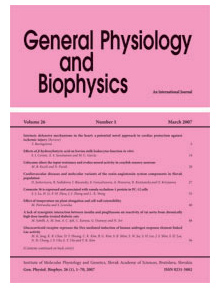Journal info
Aims and Scope |
||
Select Journal
Journals
Bratislava Medical Journal Endocrine Regulations General Physiology and Biophysics 2024 2023 2022 2021 2020 2019 2018 2017 2016 2015 2014 2013 2012 2011 2010 2009 2008 2007 Neoplasma Acta Virologica Studia Psychologica Cardiology Letters Psychológia a patopsych. dieťaťa Kovove Materialy-Metallic Materials Slovenská hudbaWebshop Cart
Your Cart is currently empty.
Info: Your browser does not accept cookies. To put products into your cart and purchase them you need to enable cookies.
General Physiology and Biophysics Vol.41, No.4, p. 263–274, 2022 |
||
| Title: Induction of apoptosis through inactivation of ROS-dependent PI3K/Akt signaling pathway by platycodin D in human bladder urothelial carcinoma cells | ||
| Author: Cheol Park, Hee-Jae Cha, Hyesook Lee, Jin-Woo Jeong, Min Ho Han, Kyoung Seob Song, Gi-Young Kim, Young-Chae Chang, Sun-Hee Leem, Jin Won Hyun, Heui-Soo Kim, Su Hyun Hong, Yung Hyun Choi | ||
| Abstract: Platycodin D (PD) is a triterpenoid saponin, a major bioactive constituent of the roots of Platycodon grandiflorum, which is well known for possessing various pharmacological properties. However, the anti-cancer mechanism of PD in bladder cancer cells remains poorly understood. In the current study, we investigated the effect of PD on the growth of human bladder urothelial carcinoma cells. PD treatment significantly reduced the cell survival of bladder cancer cells associated with induction of apoptosis and DNA damage. PD inhibited the expression of inhibitor of apoptosis family members, activated caspases, and induced cleavage of poly (ADP-ribose) polymerase. PD also increased the release of cytochrome c into the cytoplasm by disrupting the mitochondrial membrane potential while upregulating the expression ratio of Bax to Bcl-2. The PD-mediated anti-proliferative effect was significantly inhibited by pre-treatment with a pan-caspase inhibitor, but not by an inhibitor of necroptosis. Moreover, PD suppressed the phosphoinositide 3-kinase (PI3K)/Akt/mammalian target of rapamycin (mTOR) signaling pathway, and the apoptosis-inducing effect of PD was further enhanced by a PI3K inhibitor. In addition, PD increased the accumulation of reactive oxygen species (ROS), whereas N-acetyl cysteine (NAC), an ROS inhibitor, significantly attenuated the growth inhibition and inactivation of the PI3K/Akt/mTOR signaling caused by PD. Furthermore, NAC significantly suppressed apoptosis, DNA damage, and decreased cell viability induced by PD treatment. Collectively, our findings indicated that PD blocked the growth of bladder urothelial carcinoma cells by inducing ROS-mediated inactivation of the PI3K/Akt/mTOR signaling. |
||
| Keywords: Platycodin D — Apoptosis — ROS — PI3K/Akt/mTOR | ||
| Published online: 28-Jul-2022 | ||
| Year: 2022, Volume: 41, Issue: 4 | Page From: 263, Page To: 274 | |
| doi:10.4149/gpb_2022013 |
||
|
|
 download file download file |
|

